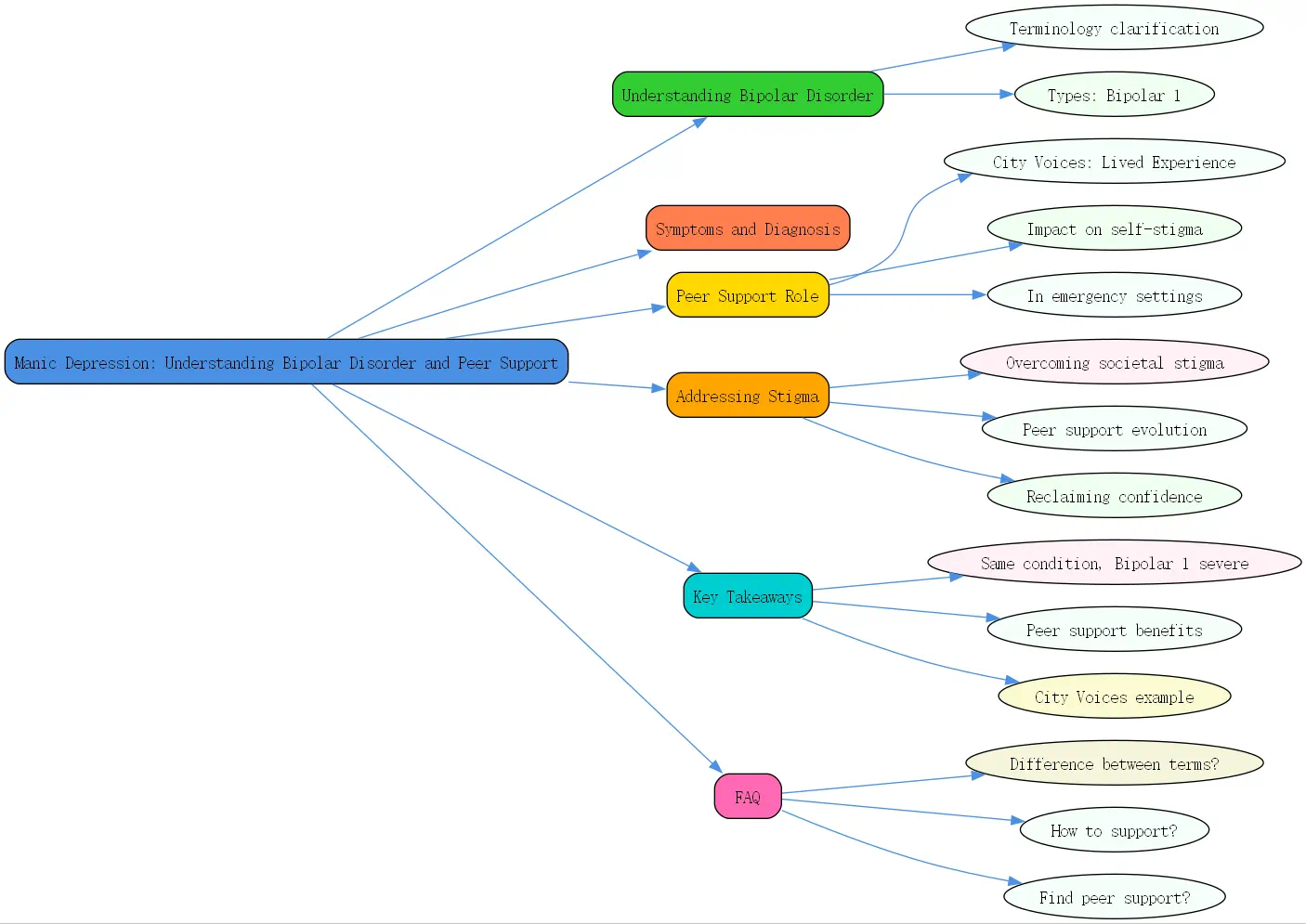Understanding Manic Depression and Bipolar Disorder

Manic Depression vs. Bipolar Disorder: Clarifying the Terminology
Manic depression and bipolar disorder refer to the same mental health condition, though the terminology has evolved over time. The term “”manic depression”” was commonly used historically to describe the characteristic cycling between extreme emotional highs (mania) and devastating lows (depression). Today, healthcare professionals prefer the term “”bipolar disorder”” as it more accurately describes the condition’s two opposing poles of mood states without the stigma sometimes associated with the older terminology.
Despite this clinical shift, many people still use the term manic depression, particularly those who received their diagnosis years ago or who find that this term better captures their lived experience. At BrainTalking, we recognize that both terms describe the same condition, characterized by significant mood episodes that impact daily functioning, relationships, and quality of life.
Types of Bipolar Disorder: Bipolar 1 and Bipolar Manic Depression
Bipolar disorder encompasses several subtypes, with bipolar 1 being the most severe form of manic depression. Bipolar 1 is characterized by manic episodes that last at least seven days or are so severe that hospitalization is required. These manic phases may include symptoms like grandiose thinking, reduced need for sleep, racing thoughts, and risky behaviors. Depressive episodes typically last at least two weeks, though some individuals with bipolar 1 may experience primarily manic symptoms.
Bipolar 2 disorder, while still serious, involves less severe “”hypomanic”” episodes alternating with major depressive periods. Cyclothymic disorder represents a milder form with numerous periods of hypomanic and depressive symptoms lasting for at least two years, though never reaching the full criteria for mania or major depression.
The term “”bipolar manic depression”” is sometimes used colloquially to emphasize both aspects of the condition—the manic highs and the depressive lows—that create the challenging pendulum swing of emotions experienced by those living with this disorder.
Symptoms and Diagnosis of Manic Depression (Bipolar Disorder)
Diagnosing manic depression requires careful assessment by mental health professionals who look for distinct patterns of mood episodes. During manic phases, individuals may experience:
- Abnormally elevated mood or irritability
- Inflated self-esteem or grandiosity
- Decreased need for sleep
- Racing thoughts and rapid speech
- Increased goal-directed activity
- Engagement in pleasurable but risky activities
Conversely, depressive episodes include symptoms like:
- Persistent sadness or emptiness
- Loss of interest in previously enjoyed activities
- Changes in appetite and sleep patterns
- Fatigue and low energy
- Difficulty concentrating
- Thoughts of death or suicide

The diagnosis process typically involves a comprehensive psychiatric evaluation, medical history review, and sometimes physical examinations to rule out other conditions. Many people with manic depression face years of misdiagnosis before receiving appropriate treatment, highlighting the importance of increased awareness and education about this condition.
The Role of Peer Support in Managing Manic Depression (Bipolar)
City Voices: Empowering Individuals with Lived Experience
City Voices represents a powerful example of how peer support can transform the lives of those living with manic depression and other mental health conditions. Founded by Ken Steele, author of “”The Day the Voices Stopped,”” and later led by Dan Frey, City Voices began as a newspaper and evolved into a multifaceted support organization based in New York.
Dan Frey’s Story: From Mental Illness to Advocacy
Dan Frey’s journey exemplifies the potential for growth and purpose that can emerge from personal struggle. After being diagnosed with a serious mental illness in 1998, Dan connected with a mental health advocate who became his mentor. When his mentor passed away, Dan stepped into a leadership role with City Voices, transforming his own experience with mental illness into a platform for helping others.
“”I came down with a serious mental illness in 1998,”” Dan explains, “”and then in 1999 I was connected with a mental health advocate who also suffered from the same mental illness I was diagnosed with.”” This connection proved transformative, illustrating how shared experience creates unique bonds that can facilitate healing.
The Friendship Squad: Building Lasting Connections
One of City Voices’ innovative initiatives is the Friendship Squad, which pairs individuals secure in their recovery with peers who may be struggling. This program recognizes that meaningful human connection is a powerful component of recovery from conditions like manic depression bipolar disorder.
The Friendship Squad operates on a simple but profound principle: authentic friendship can stand the test of time and provide crucial support during difficult periods. Volunteers like Laura and Stania build relationships with individuals facing similar challenges, offering understanding that comes only from shared experience.
Peers in Person (PIPs): Creating Community Through Shared Experience
Even during the isolation of the COVID-19 pandemic, City Voices maintained connection through Peers in Person (PIPs) events. These gatherings in Central Park allowed small groups to maintain vital in-person contact while most activities shifted online.
As Dan describes, “”We called it PIPs—Peers in Person. A peer is someone with a serious mental health or addiction challenge.”” These events demonstrate the organization’s commitment to maintaining human connection even during challenging circumstances, recognizing that isolation can be particularly detrimental for those managing conditions like manic depression bipolar 1.
The Impact of Peer Support on Self-Stigma and Recovery
Peer support addresses not only external stigma but also the equally damaging self-stigma that often accompanies a diagnosis of manic depression. Dan Frey articulates this powerfully: “”Self-stigma is considering yourself to be damaged and in need of help from a source to repair you, but in reality, everybody’s damaged because everybody’s a trauma survivor.””
This perspective shift—from seeing oneself as fundamentally broken to recognizing universal human vulnerability—can be transformative. Peer support facilitates this shift by creating spaces where individuals can witness others living full, meaningful lives despite similar diagnoses.
For those with manic depression bipolar disorder, connecting with others who understand the unique challenges of cycling between extreme mood states can provide validation and hope that professional support alone sometimes cannot offer.
Laura’s Journey: Peer Support in Emergency Room Settings
Laura’s work demonstrates how peer support can be integrated into clinical settings to enhance traditional treatment approaches. Working in an emergency room, she connects with patients facing acute mental health crises, including those with manic depression and addiction issues.
“”I have been a certified addiction recovery peer for five years,”” Laura shares. “”The best thing that ever happened to me was receiving a dual diagnosis after an overdose attempt… because I was able to deal with not only my mental health crisis but also work on the addiction part of it.””
Laura’s ability to connect authentically with patients stems directly from her lived experience. For individuals entering the healthcare system during a manic or depressive episode, encountering someone who has navigated similar challenges can provide immediate comfort and hope.
Addressing Stigma and Promoting Awareness of Manic Depression
Overcoming Societal Stigma Surrounding Mental Illness
Stigma remains one of the most significant barriers to effective treatment and support for those with manic depression. Misconceptions about mental illness create fear and distance, preventing many from seeking help or disclosing their condition to others.
As Dan notes, there’s a persistent challenge in convincing society “”that people with mental illness aren’t crazy lunatics and are actually here to help, we’re actually here to be your friend and to contribute.”” This work happens not through grand campaigns but through daily interactions where individuals with lived experience demonstrate their capacity, resilience, and humanity.

Organizations like BrainTalking and City Voices play a crucial role in normalizing conversations about conditions like manic depression bipolar disorder, helping to shift public perception through education and personal stories.
The Evolution of Peer Support and its Recognition by Professionals
Peer support has gained increasing recognition within professional mental health circles as an essential component of comprehensive care. Stania observes that “”the whole idea of peer support has been an evolution and I think people are starting to embrace it and realize that it really works—lived experience does work.””
This evolution represents a significant shift in mental healthcare, moving from a purely medical model toward one that values experiential knowledge alongside clinical expertise. For individuals with manic depression, this means more holistic support that addresses not just symptoms but the full lived experience of the condition.
Healthcare systems are increasingly incorporating certified peer specialists into treatment teams, recognizing that peers can bridge gaps between clinicians and patients, particularly for conditions like bipolar manic depression where trust can be difficult to establish.
How Peer Support Helps Individuals Reclaim Confidence and Heal
The healing power of peer support extends beyond symptom management to address the deeper wounds that often accompany a diagnosis of manic depression. As Dan explains, “”What peer support does is it helps peers and whoever else wants to engage in it to heal oneself with the support of others and especially to heal and to regain the confidence you lost after receiving a label.””
This reclamation of confidence and identity is particularly crucial for those with manic depression bipolar 1, where the severity of episodes can lead to profound questioning of one’s capabilities and worth. Peer relationships provide living proof that a meaningful life is possible despite the challenges of the condition.
Through organizations like City Voices, individuals find not just support but purpose—transforming their own painful experiences into resources that benefit others. This reciprocity creates a healing cycle that strengthens recovery for everyone involved.
Key Takeaways About Manic Depression and Peer Support
- Manic depression and bipolar disorder are the same condition, with bipolar 1 representing the most severe form
- Peer support provides unique benefits that complement professional treatment for manic depression
- Organizations like City Voices demonstrate how lived experience can be transformed into valuable support for others
- Both external stigma and self-stigma present significant challenges for those with manic depression bipolar disorder
- The integration of peer support into traditional healthcare settings represents a positive evolution in mental health treatment
Frequently Asked Questions
What’s the difference between manic depression and bipolar disorder?
Manic depression and bipolar disorder are different terms for the same condition. The medical community has largely shifted to using “”bipolar disorder”” as it’s considered more precise and less stigmatizing, but many people still use “”manic depression,”” particularly those who were diagnosed when this was the standard terminology. Both terms describe a condition characterized by cycling between extreme emotional highs (mania) and lows (depression) that significantly impact daily functioning.
How can I support a loved one with manic depression bipolar disorder?
Supporting a loved one with manic depression involves several approaches. First, educate yourself about the condition to understand what they’re experiencing. Encourage treatment adherence while respecting their autonomy. Learn to recognize warning signs of mood episodes and develop a plan for addressing them. Provide consistent emotional support without judgment, and remember to care for your own wellbeing too. Consider connecting with support groups for families of those with bipolar disorder, where you can learn from others’ experiences and share your own challenges.





